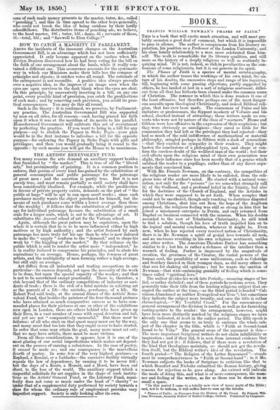THE ARTISTS' BENEVOLENT FUND.
Fon many reasons the arts demand an auxiliary support besides that farnished by "the market." This is true of all the "liberal arts," but preammently of painting. It is a common position to enforce' that genius of every kind has gained by the substitution of general consumption and public patronage for the patronage of great men : and the assertion is partly true. But it is not purely true, and must remain partially so until society shall have been considerably idealized. For example, while the predilection in favour of private property exists, demands on the part of "the public at large" will be apt to run upon small works ; since each purchaser mostly wants the object purchased for himself, but the means of each purchaser come within a lower average than those of the,wealthy : it follows that the substitution of public patron- age for individual patronage favours the substitution of a• small scale for a larger scale, which is not to the advantage of art. It substitutes the Annual school of art for the Vatican school.
Again, although the great patron may he capricious, upon the whole it is certain that he is to be more influenced either by high motives er by high authority ; and the artist fostered by such patronage has more truly led his age than. he who is now induced. to make the "supply " conform to the "demand," and to shape his work by "the luggling. Of the market." By that reliance on the public which is said to render the artist more "independent," he is in reality induced to compromise his principles, and to abate his aspirations to an average. Hence, perhaps, the fewness of great artists and the multiplicity of men forming rather a high average, but still only an average. Art differs from all industrial and trading occupations in one particular—its success depends, not upon the necessity of the work to be done, but upon the special capacity of the worker • and that is not to be ascertained except practically. There is therefore, a risk beyond that of the ordinary competitions of industry or acci- dents of trade; • there is the risk of a fatal mistake in selecting art as the pursuit of a life—the mistake, perchance, of a life. Sir Robert -Peel said truly., at the annual dinner of the Artists' Bene- volent Fund, that besides the painters of the four thousand pictures who have attained so much comparative success as to have com- manded places for their pictures at one or other of the exhibitions now open in London, there are others behind who have given u their lives, in a vast number of cases with equal devotion and and yet are not "comparatively successful.' But there Must be failures : of all who start on that quest many must err by the way, and many must find too late that they ought never to have started. In order that some may attain the goal, many more must set out; that we may have artists, there must be more victims. From all these considerations, it appears how it is one of the most glaring of our social imperfections which makes art depend- ent on the process of earning a subsistence. In the ease of poetry, it cannot be made so ; and one consequence is the marvellous dearth of poetry. In some few of the very highest geniuses—a Raphael, a Rossini, or a Labliuthe—the excessive facility virtually repeals the law of dependency, by calming it to be never felt ; but the days of a Keats, a Mozart, and a Hood, have been cut short, to the loss of the world. The auxiliary support which a respectful solicitude for art supplies in the shape of such institu- tions as the Artists' General Fund, or the Literary Fund, mani- festly does not come so muck under the head of " charity " as under that of a supplemental duty performed by society towards a class for whom the ordinary rule of employment provides very imperfect support. Society is only looking after its own.


























 Previous page
Previous page